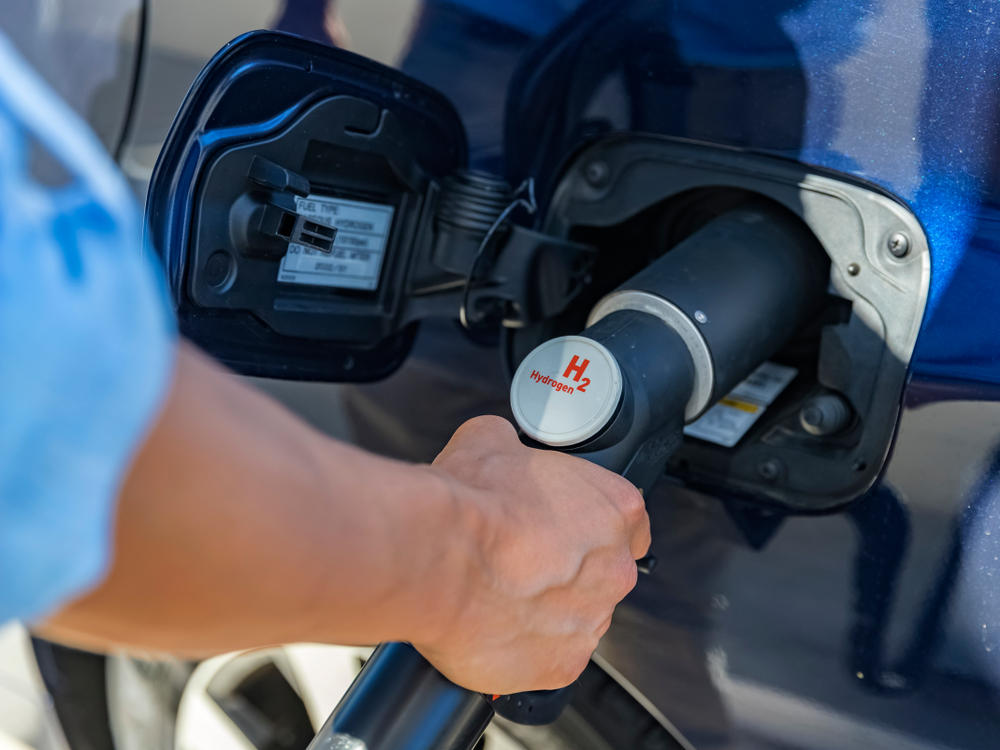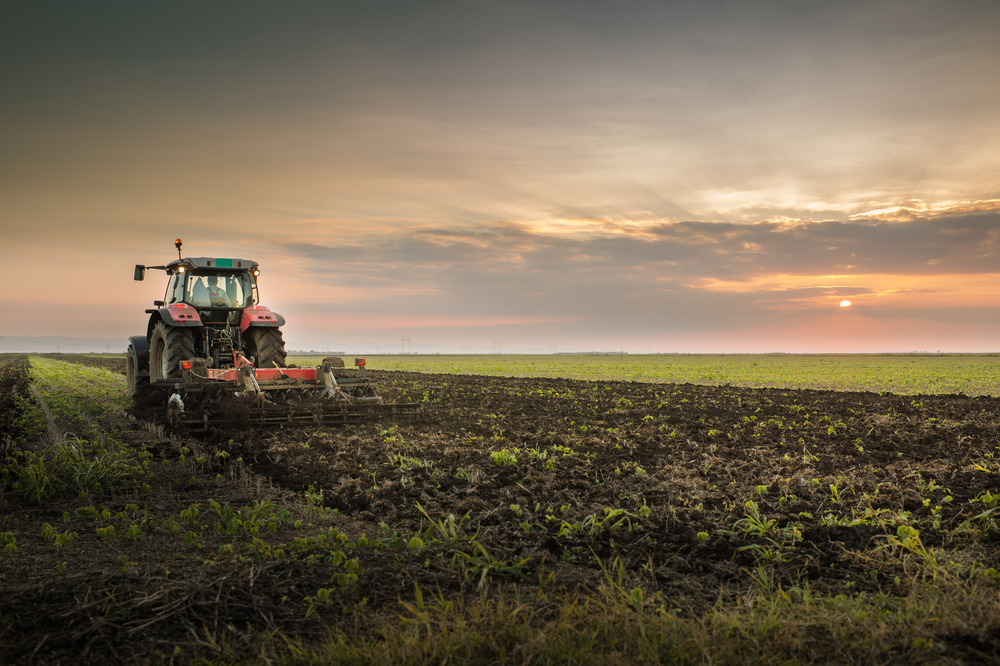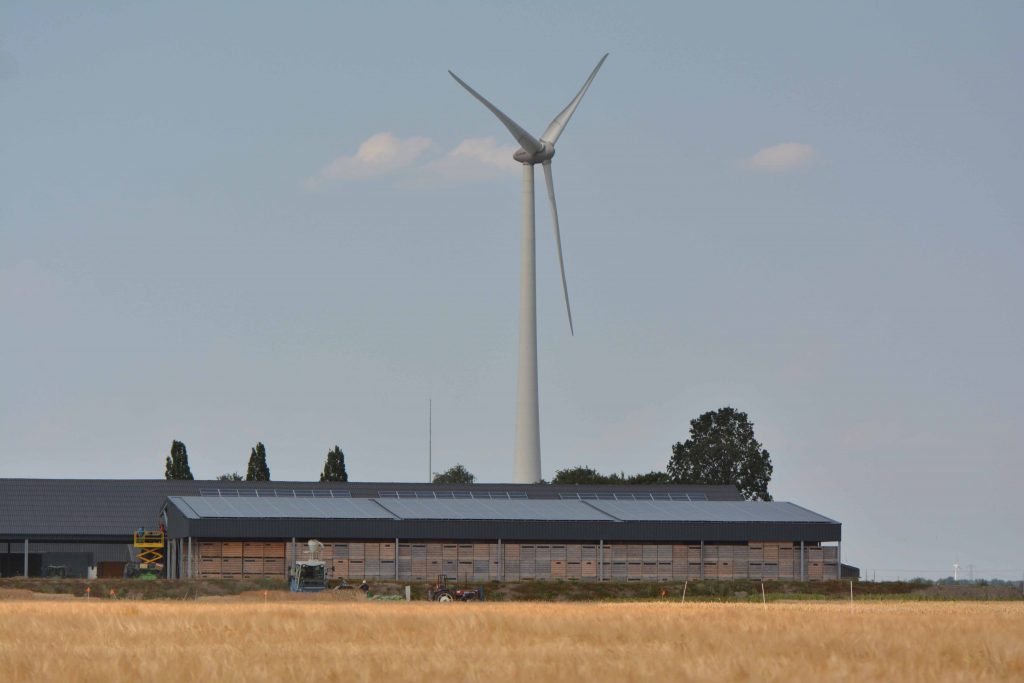Hydrogen: sustainable energy storage and clean fuel for farmers
Many farmers make use of solar panels or windmills to generate energy. However, the local network is not always able to process this energy. Furthermore, while energy is most needed in the winter, it’s primarily produced in the summer months. Wageningen researchers are now studying ways for farmers to store energy in the form of hydrogen. Hydrogen gas may then be used by the farmer as a source of energy for their business, but also as a clean fuel for tractors and lorries. Do you consider hydrogen the energy solution of the future?
“Many people, including myself, believe that hydrogen will become an important fuel and that an increasing number of people will drive hydrogen-powered cars in the future. There is a global increase in interest for hydrogen from companies,” states Chris de Visser, Business unit manager Field Crops at Wageningen University & Research. “We cannot just continue burning petrol and diesel. These resources are getting depleted and emit a lot of CO2 when burned, which contributes to global warming. Vehicles powered by hydrogen emit only water.” Water consists of hydrogen and oxygen.

An increasing number of people may drive hydrogen-powered cars in the future
Energy carrier
De Visser and his colleagues research the possibilities of using hydrogen in agriculture. This volatile gas can be used not just as fuel, but also as a carrier for energy. This could provide farmers with a much-needed solution for the energy they generate using solar panels or windmills since the electricity network is not equipped to handle the amounts of current generated. “Farmers in rural areas are generally situated at the end of the power network. Thus, the wires are simply too thin to process the large amounts of current delivered to the network on peak moments,” De Visser explains.
“It has been said for some time; hydrogen is a sustainable solution. But there has been little investment in research. We are going to study how much hydrogen we can produce with renewable energy, and how we can apply it.”
Seasons
Supply and demand are not sufficiently synchronised. On clear days, for example, large quantities of solar power are generated during the day-time, but this electricity is most needed during the evenings when people are at home and need lighting and use their appliances. Furthermore, there is an imbalance between seasons. “While there is a lot of solar energy during the summer, this energy is most needed during the winter months. Although windmills provide slightly more energy during the winter, we can’t simply run home and switch on our washing machine when there is a gust of wind,” De Visser states.
As a result of this imbalance and the limited capacity of the network, farmers are sometimes even forced to switch off their arrays because the network is unable to process the supply. The produced energy cannot be stored in batteries. De Visser: “Batteries are extremely expensive. They can be used to cushion smaller, temporary fluctuations in the day-night cycle, but are not suited to compensate for the seasonal imbalance.”
Tractors
Solar and wind energy can be used to produce hydrogen through electrolysis. In this process, sustainable electricity is used to split water molecules into hydrogen and oxygen. This process is reversible, producing water, heat and electricity. “Farmers can then use this electricity in times of energy shortage, such as in the winter.”

Most agricultural vehicles are powered by diesel. However, there are already tractors that are powered by hydrogen
Hydrogen can also replace the propane gas used by farmers to dry products such as potatoes, onions and carrots, and as a clean fuel for tractors, forklift trucks and lorries. Currently, these machines are powered by diesel. “Hydrogen is a sustainable solution. Heavy machines are needed for hefty work such as uprooting potatoes and beets, especially in clay soils. This requires a lot of fuel.” There are already tractors that are powered by hydrogen, De Visser continues. “This technology is available but is still in its infant stages.” Electrically powered farming vehicles are also available but require a large battery capacity to prevent them from having to be recharged frequently. According to De Visser, it is quite a challenge to get all of society to operate on electricity. “That would require a significant increase in network capacity.”
Fire safety and energy loss
“It has been said for some time; hydrogen is a promising alternative. But there has been little investment in research.” And this research is much needed, as some important questions concerning hydrogen production and storage are yet unanswered. For example, the high pressure under which hydrogen must be stored, as well as its high flammability causes concern. De Visser: “We need to discover how to create fireproof conditions. I am convinced this is possible, just as it was possible for LPG (Liquid Propane Gas).”
An additional concern is the approximately 25 per cent energy loss that results from converting electricity into hydrogen. “But it is sustainable energy, generated from abundantly available resources. The sun provides us with much more energy than we can use on a global scale. And, as soon as society embraces the use of hydrogen, technology will be developed to reduce energy loss.”
Stimulus
“As is always the case with innovations, businesses must first discover if there is a market for the product. Government stimuli and subsidies can speed up this process. This is what happened with the introduction of windmills,” says De Visser. The Ministry of economic affairs funds the five-year project that his business unit will launch in collaboration with TNO this summer. “We expect to produce hydrogen in large quantities at sea and, in this project, we will simulate this process on land to see how much hydrogen we can produce, and what we can use it for.”

The Wageningen University & Research testing station in Lelystad
This research will be carried out at the Lelystad testing station, which, boasting an area of some 800 hectares, is the largest of the experimental farms managed by the Business unit Field Crops. “In Lelystad, we have windmill parks, experimental windmills, solar panels and solar farms on roofs of buildings. We are going to be producing a lot of sustainable energy.”
Pioneers
Some farmers are already considering the possibilities of using hydrogen in their business, De Visser states. “There are always early adopters with a keen interest in new technology and innovations.” Currently, it is still difficult for farmers to embrace this technology due to investment costs. The research requires the acquisition of hydrogen-powered tractors for the farm in Lelystad, for example. “You can’t just replace the entire stock of tractors. It is a gradual process. The most important thing now is to create a market, so that people are willing to invest and can trust that their investment will bear fruit.”
National Hydrogen Day on 6 February
Hydrogen could prove essential in the transition to sustainable energy within five to ten years. How does this work? You will discover on the first National Hydrogen Day on 6 February 2020 in Lelystad.
At this event, you can experience the practical use of hydrogen in machines such as a forklift truck, car and generator and well as a hydrogen pumping station. Experts from the TU Delft, Alliander, TNO and WUR will share their views on the possibilities hydrogen offers.
Acrres, the national practice centre for sustainable energy and green resources, and TNO are in charge of organising this event.
Visit the website for more information and registration (in Dutch)
Read more:
- Dossier Climate and energy
- Business Unit Field Crops
- Read this article in Dutch


Geachte heer Visser,
Is ook Olifantengras op arme gronden of langs autowegen een optie om CO2 en N en Fijnstof op te vangen en als basis voor de energie produktie een optie?
In Nederland tot 3 meter hoogte of in Europa tot 6 meter.
In China tot 12 meter hoogte !
Graag uw reactie en met vriendelijke groeten.
This research is both beautiful and important, being able to define a lot of things in agriculture going forward. If we can have this as a better alternative, that would be a milestone achievement..well done
True.
It’s a need of time.
It is really a nice and informative blog and the content is really precise. I liked your views on it. I would love to read more blogs about it. Thank you for all the information on hydrogen sustainable energy storage and clean fuel for farmers and ruralco.co.nz. Keep doing and keep sharing.
I know it’s been mentioned that hydrogen is unsafe. We move propane around all the time and that is more volatile than hydrogen. Two compressed gas tanks, one with hydrogen and one with propane were placed in a target area. A sharp shooter knocked off the valves of both tanks with bullets. The propane tank exploded but the hydrogen tank didn’t even explode.
Fine to solution thank
MOHAMED ALI Hashmi
Congratulations on your pioneering spirit and market-oriented approach to adopting hydrogen and hydrogen-related technologies in agriculture. I am a follower of Prof. Ad van Wijk’s findings on the potential of a regional hydrogen production, transmission, storage and delivery system, involving Greece, Bulgaria and Romania. Your research and experiments should be disseminated in this part of the EU for two good reasons: an excessively high GHG emissions levels and a very promising agricultural sector (on top of Europe’s longest sunny periods annually). Should you feel like establishing some research and/or business links to Bulgaria or to the three countries mentioned, I’d be delighted to help you with this. Needless to say, there are EU funds to support such cooperation.
Peter Poptchev, Sofia
00359 889 272 548
I appreciate your views. This gas not only reducing feul consumption it also improve engines performance so I thing it is interesting idea all over the world.